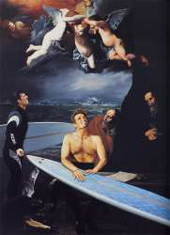Course Introduction & Background
“I was talking to the Prime Minister in Barbados about how some of our people out in my state prefer surfing to working.” — President Ronald Reagan, 1982
Perspectives on Inquiry courses are designed so that we can explore questions and issues that draw on multiple disciplines and materials. In this section of Perspectives we explore the history, art, political economy, physics, and cultural phenomena of surfing and other board sports. Our main inquiry will be to ask, “what kinds of encounters do we want to promote between people in our lives? Do we see these encounters in representations of surfing?”
This is not a sports history course, or a how-to-be-a-surfer course. Rather, we inquire into representations of surfing, and, by extension, other “board sports.” Our explorations will include art and design (Carson), aging studies (“Surfing for Life”), disabilities (“Ano Natsu Ichiban Shizukana Umi”), history (Twain, Earhart, Cook), breast-cancer research (“Heart of the Sea”), race (“Black Masculinity and ‘Blue Crush’”), class (“Dogtown and Z-Boys” and “Endless Summer”) and gender (Gerhardt; Messner; Craig).
We will use a variety of research and analytic tools to ask — and to write about — a related set of questions:
- Visual, Textual, and Contextual Analysis: How do people talk about, narrate, represent, and visualize the experience of surfing? How do academic and scholarly tools help us understand those experiences in ways that are different than popular representations?
- Gender & Language: Is surfing a masculine activity? Is the intersection of competition and cooperation made visible by particular uses of language – and are those uses different between men and women?
- Culture: Why are surfing, snowboarding, and skateboarding such popular activities? Who participates in those activities, and who does not? Are these activities markers of subcultures?
- Political Economy: Who controls the companies that design and produce surfboards, skateboards, and snowboards? Who controls, produces, and markets “board-sport” related music and fashion? How is that control exercised?
- Environment: Is riding a board on cement, water, or snow a natural activity? What do surfers, skateboarders, and snowboarders “leave behind”?
Guest Speakers
Rick Boss, Great Lakes Surfing Association (culture, environment)
Matt Andis, The Surfrider Foundation, Lake Michigan Chapter (environmental activism)
Erin Smith, MTU Humanities Professor (gender, sport, and film)
Michael Dziobak, MTU Research Scientist (Azores; Lake Superior)
“Skaters by their very nature are urban guerillas. They make everyday use of the useless artifacts of the technological burden, and employ the handiwork of the government/corporate structure in a thousand ways that the original architects could never dream of.” — Craig Stecyk, Photojournalist
